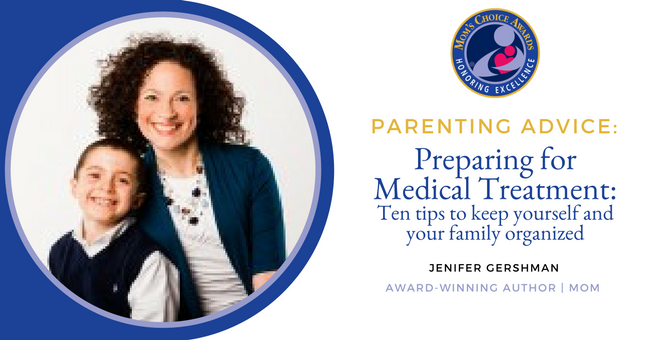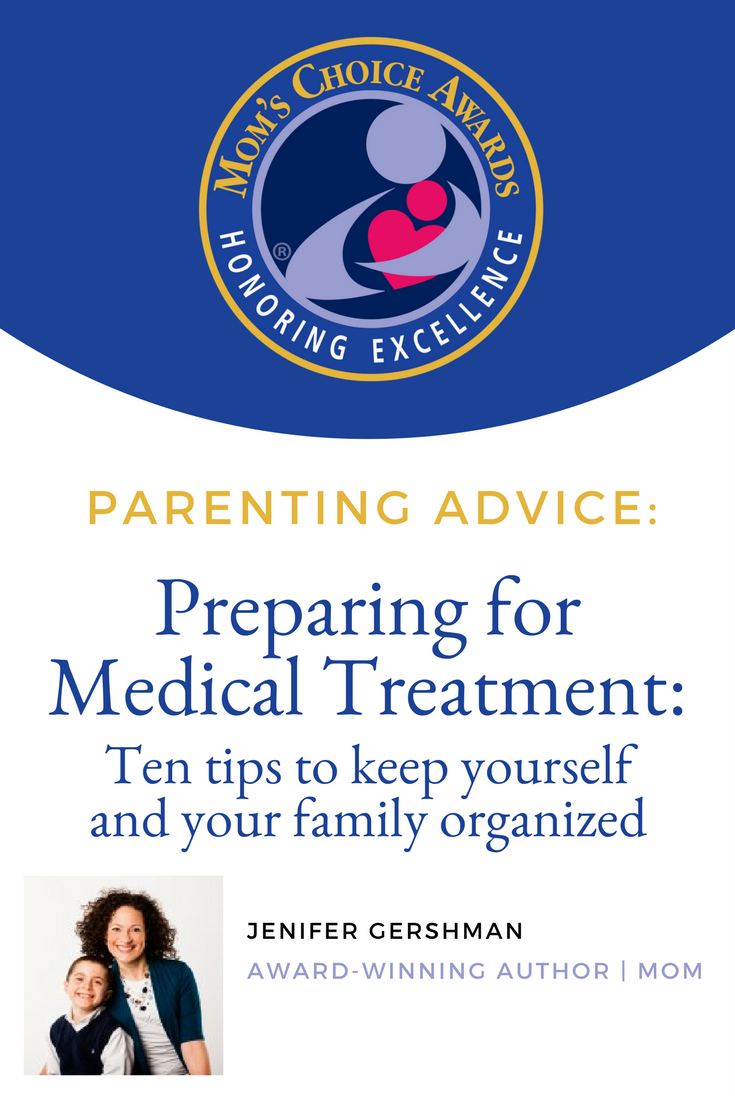 Jenifer Gershman
Jenifer Gershman
Mom’s Choice Award-winning author
Website
As a parent, being diagnosed with a serious illness and facing intense and aggressive treatment is not only devastating news…it’s downright inconvenient! There is so much we do to keep our families healthy and happy, and our houses running…who can replace us? Ours are big shoes to fill, so all the more reason to think positive, stay strong, and focus on getting healthy and well again.
For my own bone marrow transplant in 2007, I was required to leave my home and rent a small apartment within five minutes of Boston Medical Center (which wasn’t exactly in our budget). It was tough enough knowing I’d have to be away from my four year-old son, Jason, for a month or longer, but now I had the daunting task of making sure things kept running smoothly at home while simultaneously preparing myself for my own medical treatment.
Once I had processed the news of my diagnosis and treatment, I prepared myself for the hardest part: Asking for and accepting help. I found this incredibly difficult, as I took pride in being a mom who did it all such as taking care of my home and family, volunteering in the community, while still squeezing in some time for myself. I had no other choice but to rely on my friends and family. I only had to look at Jason to know that I was doing the right thing by graciously accepting the generous and selfless offers of assistance extended to me.
I was very fortunate that my mother-in-law was able to move in and keep Jason’s daily routine going without interruption. One thing’s for sure; most patients receiving treatment for a serious illness, whether they are allowed to live at home or not, will not be physically up to performing the tasks they normally do. Even if I had been able to stay at home, I surely would have required help until I was strong enough to do things on my own.
At the time, I wasn’t working outside the home, but had I been I would have needed to take a medical leave of absence. Even my husband, Steve, had to make special arrangements with his employer to work remotely, since he was required to accompany me for the duration of the treatment. Every diagnosis carries a different treatment protocol, and often a patient can remain at home, and even continue working, but for now I’ll share the tips that worked for me during my personal experience. Whatever your particular situation is, here are a few of the strategies I used to keep myself, my family and my home organized while I was gone without missing a beat!
 1.) Plan ahead: Schedule the kids’ doctor, dentist and haircut appointments (perhaps one more mani/pedi or massage for you?), purchase birthday presents and attach the party invitation to them; shop for new sneakers, camp gear, whatever the kids will need while you’re in treatment. We hit the wholesale club and stocked the house with paper goods, toiletries, pantry items and lunch box staples.
1.) Plan ahead: Schedule the kids’ doctor, dentist and haircut appointments (perhaps one more mani/pedi or massage for you?), purchase birthday presents and attach the party invitation to them; shop for new sneakers, camp gear, whatever the kids will need while you’re in treatment. We hit the wholesale club and stocked the house with paper goods, toiletries, pantry items and lunch box staples.
2.) Keep ’em busy: I wanted to keep Jason’s routine as stable and familiar as possible. I set up a few weeks of day camp, swimming lessons, and he continued his taekwondo program. I also sent out an “SOS” email to my closest friends and arranged a couple of play dates each week during my treatment, as well as a month or two after I expected to return home. Next to every appointment I included the name, address and phone number of where Jason would be. Once I had my son’s social schedule set, I printed out three copies: one for me, one for my parents, and one for my mother-in-law.
3.) Find a body double: A stay-at-home mom really doesn’t stay at home…we stay in the car! To make things easier for Nana Sue, I arranged as much transportation with family and friends as possible, and tried to create a predictable routine for Jason. So for example, my mother would bring him to taekwondo every Monday, or the same friend would bring him home from camp every Tuesday. Don’t forget to tell teachers and instructors who to release your child to on which days; you may be required to provide written notice, so be sure and do so before your treatment begins.
4.) Create a manual: Whether your partner, family member or a good friend is helping out with the house and kids, it’s a good idea to put together an “Instruction Manual.” Outline the morning routines, typical meals and snacks, favorite lunchbox items; who gets vitamins or allergy pills and when; what do the kids wear to dance, karate, soccer, or lacrosse? Where are athletic gear, cleats, and water bottles kept? What time are meals, baths, bedtime? What’s the homework routine? The more the schedule stays the same, the better. Don’t forget to include a list of emergency numbers such as doctors, dentists, neighbors and favorite babysitters. Keep a list of phone numbers and email contacts for school, camp and other activities in case of absence.
 5.) Cook and freeze: I did as much meal prep as I could before I moved to Boston. One weekend, my college roommate came over and we made quiches and chicken potpies all day to stock the freezer. I gathered some favorite family recipes, shopped for all the ingredients, then spent a weekend cooking and packaging them for the freezer. Another great tool I used to stock up was Dream Dinners. I simply went online, scheduled a session and chose my entrees from the menu. Then I went to the store and assembled all of my meals for the freezer. Additionally, I was incredibly touched by the generosity of our friends and acquaintances who offered to bring over meals several times per week during and after treatment. I found the best way to coordinate this support was through CareCalendar.org. I set up a calendar and shared the personal code and password with all of those who offered to help. Not only could people just click on the day they preferred to drop off a meal, but we were able to log on and find out what was for dinner. Brilliant!
5.) Cook and freeze: I did as much meal prep as I could before I moved to Boston. One weekend, my college roommate came over and we made quiches and chicken potpies all day to stock the freezer. I gathered some favorite family recipes, shopped for all the ingredients, then spent a weekend cooking and packaging them for the freezer. Another great tool I used to stock up was Dream Dinners. I simply went online, scheduled a session and chose my entrees from the menu. Then I went to the store and assembled all of my meals for the freezer. Additionally, I was incredibly touched by the generosity of our friends and acquaintances who offered to bring over meals several times per week during and after treatment. I found the best way to coordinate this support was through CareCalendar.org. I set up a calendar and shared the personal code and password with all of those who offered to help. Not only could people just click on the day they preferred to drop off a meal, but we were able to log on and find out what was for dinner. Brilliant!
6.) Stock up: Treatment days can be long…and boring. I chose to look on the bright side and view this time away as a mini-vacation. I didn’t expect to feel very well, but what better time to catch up with those books and movies I’d been intending to get to? I borrowed books from friends, and a bunch of girls made me a list of their favorite movies to find at the rental store. I downloaded some soothing “spa” music to my iPod to help me relax during procedures.
7.) Delegate: In the weeks before I moved to Boston, I started training Jason to be a bit more independent. I encouraged him to dress himself, clear his spot at the table, pick up his toys and put his dirty clothes in the hamper. He was only four years old, but children of any age can learn to help fold laundry, put it away, empty the dishwasher, get the mail, or feed the fish. And the great thing is, they continue to do these tasks once you are well again! I took advantage of a grocery delivery service, and asked a couple of great kids on our street to come over just for an hour here and there as a “mother’s helper.”
 8.) File it: Nothing creates paperwork like a critical illness. I figured out pretty quickly that I was going to have to find a way to organize all of it. I purchased a portable file box and filled it with hanging files and folders. I created tabs for health insurance, prescriptions, medical receipts, nutrition information (for my post-treatment diet), lease agreement, treatment calendar, etc. Even after the treatment is over, the paperwork keeps coming, so this is a good system to put in place early.
8.) File it: Nothing creates paperwork like a critical illness. I figured out pretty quickly that I was going to have to find a way to organize all of it. I purchased a portable file box and filled it with hanging files and folders. I created tabs for health insurance, prescriptions, medical receipts, nutrition information (for my post-treatment diet), lease agreement, treatment calendar, etc. Even after the treatment is over, the paperwork keeps coming, so this is a good system to put in place early.
9.) Start fresh: Any chemotherapy regimen can compromise your immune system, and after my bone marrow transplant, I wouldn’t even have one. I tossed all of my cosmetics and purchased new mascara, lip gloss, eyeliner, as well as new makeup brushes and sponges. Don’t forget razors, nail files, and toothbrushes as well.
10.) Stay in touch: Whether you blog, post, tweet, or update, everyone who cares about you is going to want to keep up with how you’re doing. I chose to stay in touch with a simple email. Set up an email distribution list with all of your contacts. If I wasn’t up for writing, Steve could send an email easily by clicking once on the list. I also kept a notebook to track all of the people I wanted to write thank-you notes to once I returned home.
Once you have yourself, the kids, and the house organized, you can concentrate on the real priority—recovery and healing.
Would you like to use this article for your own website or newsletter? No problem! But here’s what you must include: “Jenifer Gershman is the author of Where Did Mommy’s Superpowers Go? Helping Kids Understand a Parent’s Serious Illness, for which she earned a Silver Mom’s Choice Award. Based on Jenifer’s own personal experience, this heartwarming picture book is a positive and upbeat resource for any family struggling with a critical health crisis while raising young children. Unlike other children’s books which specify a particular illness, this engaging story is not disease-specific, making it a useful and uplifting tool for any family facing this challenge, regardless of diagnosis. For more information about Jenifer and the creation of this book, please visit her blog at www.tinyurl.com/mommypower. If you or someone you know would like a copy of Where Did Mommy’s Superpowers Go? please visit www.tinyurl.com/buymommypower.
This post was originally post on the now-defunct Mom’s Choice Matters blog.
 About Jenifer Gershman
About Jenifer Gershman
Jenifer Gershman is the author of Where Did Mommy’s Superpowers Go? Helping Kids Understand a Parent’s Serious Illness, for which she earned a silver Mom’s Choice Award. Based on Jenifer’s own personal experience, this heartwarming picture book is a positive and upbeat resource for any family struggling with a critical health crisis while raising young children. For more information about Jenifer and the creation of this book, please visit her blog. You can buy a copy of the book by clicking here.
View all posts by Jenifer Gershman here.








8 Comments on “Preparing for Medical Treatment: Ten tips to keep yourself and your family organized”
Wow these are all great tips. I have noted all points on my notebook. Thanks for sharing.
Thanks for reading Deanna and hopefully you won’t need them!
Great tips ! Thank you
Such a wonderful story , thank you for sharing . Very heartwarming and great tips to follow .
excellent information !! thanks for sharing =)
Thanks for your sharing!
Thanks for reading Sheila!
Thanks for sharing these wonderful tips these are sure to come in handy when raising a family!